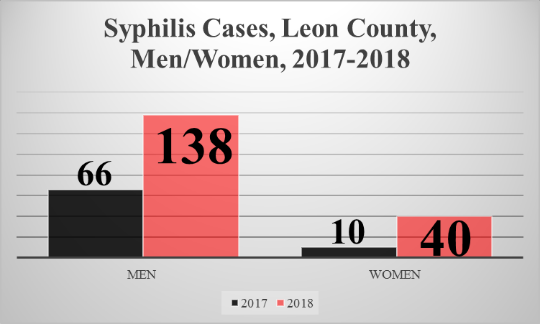Did you know that in 2000, rates of syphilis reached historic lows in the  United States?
United States?
Since 2013, syphilis rates have increased in every region and in almost every race/ethnicity and age group across the U.S., and in 2017, more than 100,000 cases of syphilis in the U.S. were reported to the CDC. Rates of early syphilis (the most infectious stages) increased more than 70% overall and 156% in women. Cases of congenital syphilis, which is transmitted from parent to fetus, more than doubled to over 900.
Local health departments (LHDs) are the frontlines of preventing, testing, and treating STDs and are tackling the rise in syphilis with innovative strategies. To highlight the work of one such LHD, NACCHO interviewed Claudia Blackburn, MPH, RN, Health Officer for the Florida Department of Health in Leon County (DOH-Leon), to learn more about their syphilis strategic plan.
What indicated to you that Leon County should create a syphilis strategic plan?
 Leon County experienced a significant increase (134%) in syphilis cases from 2017 to 2018. We had six congenital syphilis cases between 2014 and 2018. A briefing by staff in October caused me to sound the alarm at the state and local level.
Leon County experienced a significant increase (134%) in syphilis cases from 2017 to 2018. We had six congenital syphilis cases between 2014 and 2018. A briefing by staff in October caused me to sound the alarm at the state and local level.
What is your top priority with the “Stomp Out Syphilis” plan?
Our top priority is working with partners to increase awareness about syphilis and taking the appropriate action when it’s suspected. We decided to convene our partners for a special call-to-action meeting to launch the Leon County Syphilis Prevention Coalition. After a brief presentation, participants joined a group discussion on four areas: 1) education, 2) outreach, 3) social media and 4) testing. Partners, more than 60 of whom attended the meeting, were asked to commit to assisting with one or more of those areas.
How will partners be important in carrying out the plan?
Partners are critical because of the limited resources at the health department. We are asking partners to learn how to use rapid syphilis tests in the field or in their practice, if appropriate. We are refreshing the medical community on required testing during pregnancy and on how to contact us if they have a suspected case or any questions about STDs. We are asking for leadership on a social media campaign, assistance with education to target groups, and a collaborative approach to outreach.
What do you think other jurisdictions should know before they undertake a similar process?
It is time consuming and requires staff to break from their routine duties to thoughtfully consider the situation and take the long proactive view. Planning while in crisis mode takes discipline. It is still early in the process, so we don’t know how successful we’ll be, but we certainly know that we must continue to engage partners, focus our collective efforts, and be prepared to take advantage of opportunities that arise. For example, the Leon County/Tallahassee Commission on the Status of Women and Girls has made STDs a priority this year, and they asked us to submit a proposal for resources. We are also asking the County to allow us to increase our fees to fund two new DIS. There has been news coverage on our high STD rates as well as on the launch of the Syphilis Prevention Coalition, so perhaps additional resources will come our way. If so, we need to be ready to utilize them efficiently.
As Claudia mentioned, LHDs must be thoughtful about engaging partners and the media to galvanize and focus attention and resources to address the rising rates of syphilis. LHDs or their partners can author an op-ed in the local paper or strategize about how they can take the fight against syphilis to where the individuals impacted reside—like using the rapid syphilis test. See NACCHO’s Best Practices for Rapid Syphilis Testing Report and upcoming resources on writing op-eds!
NACCHO sees the fight against nationwide syphilis increases as essential. To highlight this pressing issue, there will be two sessions that will address syphilis at NACCHO Annual (July 9-11 in Orlando): one focusing on congenital syphilis and the other on the use of the rapid syphilis test in non-clinical and outreach settings. We hope that you will join us at those sessions!
If you have questions about how your community might be able to tackle syphilis rates, feel free to reach out to NACCHO to have a conversation and brainstorm. Otherwise, consider sharing the below messages on social media to help raise awareness in your communities about syphilis.
General Messages
- #Syphilis is increasing across the U.S. See what’s happening in your area: https://go.usa.gov/xEHSyExternal. #STDMonth #SyphilisStrikesBack
- April is STD Awareness Month. This year, let’s tackle the dangerous resurgence of syphilis in the U.S. Learn more: http://ow.ly/xBnK30orh9L
- This #STDMonth, let’s tackle the dangerous resurgence of #syphilis. Learn more: http://ow.ly/xBnK30orh9L #SyphilisStrikesBack
- #STDMonth Fact: Once nearing elimination, syphilis has made a comeback: http://ow.ly/xBnK30orh9L #SyphilisStrikesBack
Clinicians
- Clinicians: Here’s how to protect pregnant patients from #syphilis – https://go.usa.gov/xE6qxExternal #STDMonth #DisruptSyphilis
- Clinicians: Take routine sexual histories to determine patients’ risk and what tests may be needed: https://go.usa.gov/xE6qaExternal #STDMonth #SyphilisStrikesBack
- Clinicians: Women at high risk for #syphilis, or living in areas of high prevalence, should be rescreened at the beginning of the 3rd trimester AND at delivery https://go.usa.gov/xE6qrExternal #STDMonth #SyphilisStrikesBack
- Clinicians: Take immediate action for patients diagnosed w/#syphilis (especially if they’re pregnant!) and treat them as CDC recommends = https://go.usa.gov/xE6qbExternal #STDMonth #DisruptSyphilis
- Clinicians: Protect your gay and bisexual patients from #syphilis with this info: https://go.usa.gov/xE6qjExternal #STDMonth #DisruptSyphilis


